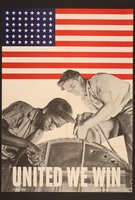Overview
- Brief Narrative
- US poster promoting the need for an integrated workforce to support the war effort. It depicts a black American and a white male working together to rivet an airplane. Roosevelt's June 1941 executive order prohibited discrimination in defense work. After the US declared war in December 1941, there was a labor shortage as war production increased and working men enlisted in the military. The War Manpower Commission, formed in 1942 to mobilize the work force, spotlighted the need to overcome prejudice and hire workers from all segments of the population. Black Americans also faced discrimination in the military and many saw the war as a double victory in a fight against fascism and racism, at home and abroad.
- Artwork Title
- United We Win
- Date
-
publication/distribution:
1943
- Geography
-
publication:
Washington (D.C.)
- Credit Line
- United States Holocaust Memorial Museum Collection. The acquisition of this collection was made possible by the Crown Family.
- Markings
- front, bottom, white on black : UNITED WE WIN
front, bottom left corner, white on black : OWI PHOTO BY LIBERMAN
front, bottom, white on black : ☆ U. S. GOVERNMENT PRINTING OFFICE : 1942—O-484339
front, bottom right corner, white on black : WAR MANPOWER COMMISSION · WASHINGTON, D. C. - Contributor
-
Photographer:
Alexander Liberman
Author: United States War Manpower Commission
Printer: United States Government Printing Office
Distributor: United States Office of War Information
- Biography
-
The United States Office of War Information (OWI) was created on June 13, 1942, to centralize and control the content and production of government information and propaganda about the war. It coordinated the release of war news for domestic use, and using posters along with radio broadcasts, worked to promote patriotism, warn about foreign spies, and recruit women into war work. The office also established an overseas branch, which launched a large-scale information and propaganda campaign abroad. The government appealed to the public through popular culture and more than a quarter of a billion dollars' worth of advertising was donated during the first three years of the National Defense Savings Program. Victory in Europe was declared on May 8, 1945, and in Japan on September 2, 1945. The OWI ceased operation in September.
Physical Details
- Language
- English
- Classification
-
Posters
- Category
-
War propaganda
- Object Type
-
Posters, American (lcsh)
- Physical Description
- Color offset lithographic poster adhered to linen backing. It has a black and white photographic image of a young black man and a young white man in work clothes riveting metal printed over a graphic depiction of a red, white, and blue American flag. The black man, in a cap with an upturned visor, leans over the airplane fuselage, while the light haired white man leans over the metal above him. Across the bottom in large white uppercase font is the slogan UNITED WE WIN.
- Dimensions
- overall: Height: 44.250 inches (112.395 cm) | Width: 32.500 inches (82.55 cm)
- Materials
- overall : paper, lithographic ink, linen, adhesive
Rights & Restrictions
- Conditions on Access
- No restrictions on access
- Conditions on Use
- No restrictions on use
Keywords & Subjects
- Topical Term
- Race relations--United States--Posters--Specimens. Prejudices--United States--Posters--Specimens. War posters, American--United States--Specimens. World War, 1939-1945--Economic & industrial aspects--United States--Posters--Specimens. World War, 1939-1945--United States--Posters--Specimens. World War, 1939-1945--Blue collar workers--American--Posters--Specimens.
- Personal Name
- Liberman, Alexander, 1912-1999.
Administrative Notes
- Legal Status
- Permanent Collection
- Provenance
- The poster was acquired by the United States Holocaust Memorial Museum in 2015.
- Funding Note
- The acquisition of this artifact was made possible by the Crown Family.
The cataloging of this artifact has been supported by a grant from the Conference on Jewish Material Claims Against Germany.
- Record last modified:
- 2022-07-28 18:30:01
- This page:
- https://collections.ushmm.org/search/catalog/irn535267
Download & Licensing
In-Person Research
- By Appointment
- Request 21 Days in Advance of Visit
- Plan a Research Visit
- Request to See This Object
Contact Us
Also in United We Win poster collection
The collection consists of two United We Win posters produced by the United States during World War II linking the need to fight fascism on the war front with the need to fight racism on the home front.
Date: 1943

US poster promoting victory over racism at home and fascism abroad
Object
US poster promoting the need for an integrated workforce to support the war effort. It depicts a black American and a white male working together to rivet an airplane. Roosevelt's June 1941 executive order prohibited discrimination in defense work. After the US declared war in December 1941, there was a labor shortage as war production increased and working men enlisted in the military. The War Manpower Commission, formed in 1942 to mobilize the work force, spotlighted the need to overcome prejudice and hire workers from all segments of the population. Black Americans also faced discrimination in the military and many saw the war as a double victory in a fight against fascism and racism, at home and abroad.




